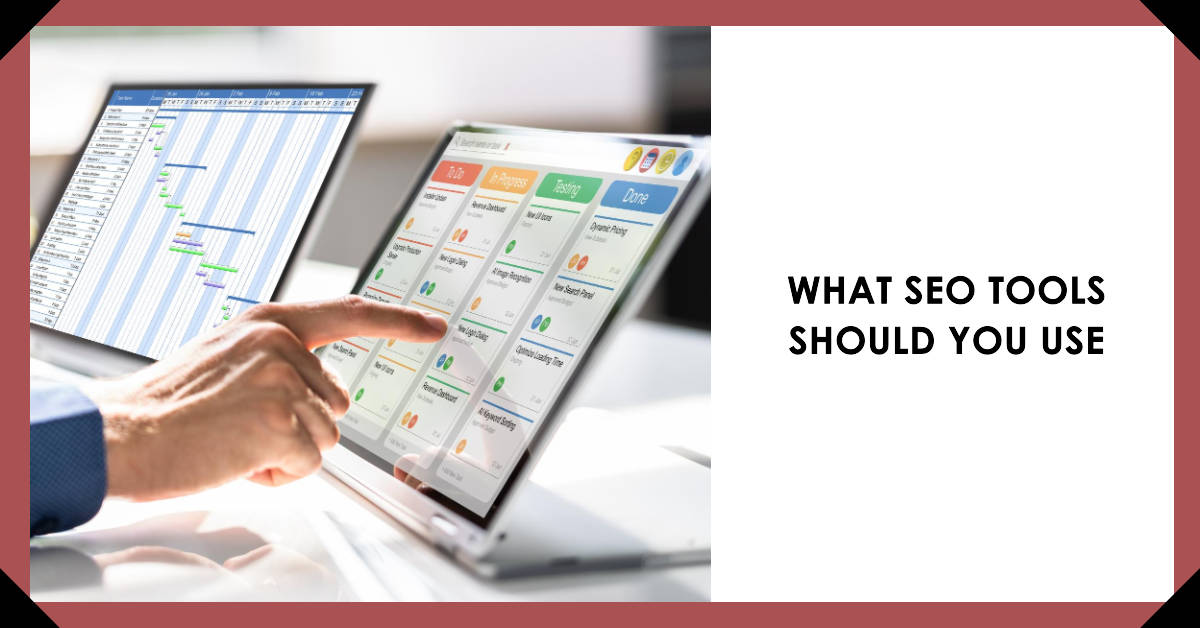What SEO tools should you use? In the competitive realm of websites, where attention and visibility are paramount, Search Engine Optimization (SEO) serves as the guiding light. In this intricate landscape of algorithms and keywords, SEO tools become your invaluable companions. Join us on this journey as we delve into the realm of SEO tools, categorize them for your convenience, introduce you to popular options, and offer guidance on selecting the right ones. Whether you’re an experienced SEO professional or a curious beginner, our guide will empower you with the knowledge to elevate your online presence and propel your website to the pinnacle of search results. Welcome to the world of SEO tools – your gateway to online success!
Table of Content
Understanding the Role of SEO Tools

In this section, we’ll demystify the world of SEO tools and explain why they’re essential for anyone looking to boost their website’s online presence. We’ll keep it simple and easy to understand.
What Are SEO Tools?
SEO tools are like your trusty companions on the journey to a successful website. They are specialized software or online platforms that help you make your website more search engine-friendly. But what does that mean exactly?
Imagine you have a shop, and you want more people to visit and buy your products. You’d want to place your shop in a bustling street where lots of potential customers walk by, right? Well, in the online world, that bustling street is Google, and SEO tools are the maps and strategies that guide you to that prime location on Google’s search results.
Why Are SEO Tools Important?
Now that we know what SEO tools are, let’s talk about why they matter. Think of SEO tools as your secret sauce for online success. Here’s why they’re so crucial:
- Keywords: SEO tools help you find the right words and phrases (keywords) people use when searching online. Using these keywords on your website can make it easier for search engines to understand what your site is about.
- Competitive Edge: In the online world, you’re not alone. Your competitors are out there too. SEO tools let you spy on them (in a friendly way!) to see what’s working for them so you can do it even better.
- Website Health Check: Just like you’d visit a doctor for a checkup, your website needs regular checkups too. SEO tools can tell you if any issues on your site need fixing, like broken links or slow loading times.
- Tracking Progress: Once you start using SEO tools, you can see how your website is doing. Are more people visiting your site? Are they staying longer? Are they buying your products or signing up for your newsletter? SEO tools can give you these answers.
In a nutshell, SEO tools are like your website’s best friends. They help you understand what’s going on, what needs improvement, and how to get more visitors.
In the next section, we’ll explore the different types of SEO tools and what each one does. So, if you’re ready to dive into the world of SEO tools, keep reading!
Categories of SEO Tools
Now that we’ve got a handle on what SEO tools are and why they matter, let’s break things down further. SEO tools come in different flavors, like ice cream at an ice cream parlor. Each type has its unique role in helping your website shine in the online world. Let’s explore these tasty categories:
Keyword Research Tools
Imagine you’re planning a road trip. Before you hit the road, you’d want to know the best routes to take, right? Keyword research tools are like your road trip planners. They help you find the most suitable keywords related to your content or business. These tools tell you what people are searching for and how often. By using the right keywords, you can lead more travelers (website visitors) to your destination (your website).
On-Page SEO Tools
When you’re decorating a room, you carefully arrange the furniture, paint the walls, and add beautiful artwork to make it inviting. On-page SEO tools are the decorators for your website. They assist in optimizing the individual pages of your site. These tools help you tweak your content, titles, headings, and images so they’re more appealing to both visitors and search engines.
Link-Building Tools
Imagine links as bridges that connect one place to another. In the online world, these bridges (links) are crucial for your website’s reputation. Link-building tools help you construct these bridges. They assist in finding opportunities to get other websites to link to yours. The more trustworthy and relevant the links, the better your website looks to search engines.
Analytics and Tracking Tools
Remember how we mentioned checkups for your website’s health? Analytics and tracking tools are your website’s doctors. They monitor your site’s vital signs, like how many people visit, how long they stay, and what they do. These tools provide valuable data, helping you understand your audience and measure the success of your SEO efforts.
Technical SEO Tools
Behind the scenes, there’s a lot of technical stuff happening on your website. Technical SEO tools are like mechanics, ensuring everything runs smoothly. They help with tasks like checking for broken links, improving site speed, and ensuring your website is mobile-friendly. These factors can affect your search engine rankings, so these tools are essential for a well-oiled website.
Content Optimization Tools
Imagine you’re baking a cake, and you want it to be perfect. Content optimization tools are your secret recipe. They analyze your content and suggest improvements. From using the right keywords to making your sentences more engaging, these tools help you bake up content that’s not only delicious but also appealing to search engines.
So, just like at the ice cream parlor, you have various flavors of SEO tools to choose from. The right mix depends on your goals and the unique needs of your website. In the next section, we’ll dive deeper into how to pick the perfect SEO tools for your journey. Stay tuned!
Factors to Consider When Choosing SEO Tools
Now that we’ve explored the different categories of SEO tools, it’s time to navigate the decision-making process. Choosing the right SEO tools for your specific needs is like picking the perfect tool for a home improvement project. Here are some factors to consider:
Your Goals and Needs
Before shopping for SEO tools, you need a clear understanding of your goals. Ask yourself:
- What are you trying to achieve with your website or online presence?
- Do you need help with keyword research, on-page optimization, or link building?
- Are you a beginner looking for user-friendly tools, or are you a seasoned pro in search of advanced features?
Knowing your goals and needs will guide you to the tools that align with your objectives.
Budget Considerations
SEO tools come in a wide range of price points. Some are free, while others require a monthly or annual subscription. Consider your budget carefully. Keep in mind that some paid tools offer additional features and support that might be worth the investment if they align with your goals.
Ease of Use
For beginners, user-friendliness is a critical factor. Look for SEO tools that have intuitive interfaces and offer clear instructions or tutorials. Complex tools might be overwhelming if you’re just starting, so simplicity can be your best friend.
Scalability
Consider whether the SEO tools can grow with your needs. As your website or business expands, you might require more advanced features. Choosing tools that can accommodate your growth will save you the hassle of switching later.
Compatibility
Ensure that the SEO tools you choose are compatible with your website platform (e.g., WordPress, Shopify) and any other software or systems you use. Compatibility issues can lead to frustration and wasted time.
Reviews and Recommendations
Take advantage of reviews and recommendations from experts and other users. Look for trusted sources and online communities where people discuss their experiences with various SEO tools. User feedback can provide valuable insights.
Trial Periods
Many SEO tools offer trial periods or free versions. Take advantage of these opportunities to test the tools and see if they meet your needs before committing to a paid subscription.
Customer Support and Resources
Consider the level of customer support and available resources. Good customer support can be a lifesaver if you run into issues, and helpful resources like tutorials and documentation can facilitate your learning curve.
Integration Capabilities
If you use other tools or software in your workflow, check if the SEO tools can integrate with them. Seamless integration can streamline your processes and save you time.
By carefully weighing these factors, you can narrow down your options and select the SEO tools that are the best fit for your goals, budget, and level of expertise. In the next section, we’ll delve into some essential SEO tools suitable for beginners, helping you get started on your SEO journey. Stay tuned!
Essential Free SEO Tools for Beginners and What SEO Tools Should You Use
Now that we’ve discussed how to choose the right SEO tools, let’s explore some essential tools that are particularly beginner-friendly. If you’re new to the world of SEO, these tools will be your trusty companions on your journey to optimizing your website for search engines.
Google Keyword Planner
Purpose: Keyword Research
Google Keyword Planner is like your digital treasure map for finding the right keywords. It helps you discover what words and phrases people are using when searching online. This tool is free and straightforward to use, making it an excellent choice for beginners. It provides data on keyword search volume, competition, and suggested keywords to target.
Yoast SEO (for WordPress Users)
Purpose: On-Page SEO
If your website is powered by WordPress, Yoast SEO is your virtual SEO assistant. It guides you through the process of optimizing your content for search engines. From checking the readability of your articles to helping you set the right keywords, Yoast ensures your pages are search engine-friendly. Even if you’re new to SEO, this plugin makes on-page optimization a breeze.
Google Search Console
Purpose: Website Health Check and Performance Tracking
Imagine having a personal health tracker for your website – that’s Google Search Console. It’s a free tool provided by Google that helps you monitor your website’s health, view search analytics, and receive alerts about issues that might affect your site’s visibility. It’s an essential tool for beginners to keep tabs on their website’s performance.
MozBar
Purpose: On-page SEO and Competitive Analysis
MozBar is like your SEO magnifying glass. It’s a browser extension that provides valuable insights when you’re browsing websites. With MozBar, you can analyze on-page elements like titles, meta descriptions, and headers. It also offers data on a website’s domain authority, which can help you assess the competition in your niche.
Google Analytics
Purpose: Website Analytics and Audience Insights
Understanding your website visitors is crucial, and Google Analytics is your go-to tool. It’s free and provides detailed insights into who’s visiting your site, how they found it, and what they do while they’re there. Google Analytics helps you make data-driven decisions to improve your website’s performance.
Ubersuggest
Purpose: Keyword Research and Content Ideas
Ubersuggest is your creative brainstorming partner. It not only helps you find keywords but also generates content ideas based on those keywords. This tool offers keyword suggestions, search volume data, and insights into the competition. It’s an excellent resource for beginners looking to expand their content.
These essential SEO tools for beginners are user-friendly and can significantly improve your website’s visibility in search engines. Remember, as you gain experience and confidence, you can explore more advanced tools and strategies. But for now, these tools will serve as your reliable starting point on your SEO journey. In the next section, we’ll delve into some advanced SEO tools for those looking to take their optimization efforts to the next level. Stay tuned!
Advanced Paid SEO Tools for Professionals
If you’ve already mastered the basics of SEO and are ready to take your optimization game to the next level, it’s time to explore some advanced SEO tools. These tools offer sophisticated features and capabilities, making them suitable for seasoned SEO professionals and marketers.
SEMrush
Purpose: Comprehensive SEO Toolkit
SEMrush is like your all-in-one SEO Swiss Army knife. It provides a vast array of features, including keyword research, site auditing, competitive analysis, and backlink tracking. SEMrush is a favorite among professionals for its in-depth insights and data visualization tools, which help you make informed decisions.
Ahrefs
Purpose: Backlink Analysis and Competitive Research
Ahrefs is your detective tool for uncovering backlink opportunities and understanding your competitors. It offers an extensive backlink database and helps you identify link-building prospects. Additionally, Ahrefs provides insights into organic search traffic and keyword ranking positions.
Screaming Frog SEO Spider
Purpose: Website Crawl and Technical SEO
Screaming Frog SEO Spider is like your website’s X-ray machine. It crawls your entire website to uncover technical issues that might affect your SEO. From broken links to duplicate content and missing meta tags, this tool helps you maintain a healthy website.
Moz Pro
Purpose: Comprehensive SEO and Rank Tracking
Moz Pro is like your SEO dashboard, providing a suite of tools for keyword research, on-page optimization, rank tracking, and site auditing. It also offers a helpful “Domain Authority” metric that assesses the overall strength of websites, helping you gauge their competitiveness.
Majestic
Purpose: Backlink Analysis and Trust Flow
Majestic is like your backlink microscope. It specializes in backlink analysis and provides metrics like Trust Flow and Citation Flow to evaluate the quality of links. This tool is invaluable for link-building and competitor analysis.
DeepCrawl
Purpose: Comprehensive Website Auditing
DeepCrawl is like your website’s personal auditor. It delves deep into your site’s structure, uncovering issues that might hinder search engine crawling and indexing. It’s particularly useful for large websites with complex structures.
CognitiveSEO
Purpose: Backlink Analysis and Content Optimization
CognitiveSEO combines backlink analysis with content optimization features. It helps you identify toxic backlinks that may harm your website’s reputation and provides content auditing tools to improve your on-page SEO.
These advanced Search Engine Optimization tools offer a wealth of features and insights, allowing professionals to fine-tune their strategies and stay competitive in the ever-evolving world of Search Engine Optimization. As you delve into these tools, remember that mastering them may take time, but the rewards in improved SEO performance are worth the effort. In the next section, we’ll explore popular SEO tools within each category, helping you make informed choices based on your specific needs. Stay tuned for more insights!
Popular SEO Tools in Each Category

Now that we’ve covered the essential categories of SEO tools and explored advanced options, let’s dive deeper into some of the popular and trusted tools within each category. Whether you’re a beginner or a seasoned pro, knowing which tools are widely recognized can be incredibly helpful. Here are some standout tools:
Keyword Research Tools:
- Google Keyword Planner: Ideal for beginners, this free tool provides valuable keyword data directly from Google. It’s user-friendly and a great starting point for keyword research.
- SEMrush: A versatile option for professionals, SEMrush offers comprehensive keyword research, competitor analysis, and more. Its keyword difficulty metric helps you identify which keywords are worth targeting.
On-Page SEO Tools:
- Yoast SEO (for WordPress): Perfect for beginners, this plugin simplifies on-page SEO optimization for WordPress users. It provides real-time feedback and suggestions as you create content.
- Moz On-Page Grader: Moz’s tool offers insights on how to optimize individual pages for search engines. It’s suitable for both beginners and professionals.
Link-Building Tools:
- Ahrefs: A go-to tool for professionals, Ahrefs provides a comprehensive backlink analysis, competitive research, and content exploration. It’s essential for link-building strategies.
- Majestic: Known for its Trust Flow and Citation Flow metrics, Majestic is favored by professionals for backlink analysis and quality assessment.
Analytics and Tracking Tools:
- Google Analytics: An absolute must for both beginners and professionals, Google Analytics offers a deep dive into your website’s performance, user behavior, and conversion tracking. It’s free and incredibly powerful.
- SEMrush Analytics: SEMrush offers detailed website traffic analysis, keyword ranking data, and competitor insights, making it a valuable tool for tracking your SEO progress.
Technical SEO Tools:
- Screaming Frog SEO Spider: Professionals swear by this tool for in-depth website crawling and technical SEO auditing. It’s ideal for identifying and fixing technical issues.
Content Optimization Tools:
- Yoast SEO (Content Analysis): In addition to on-page optimization, Yoast’s content analysis feature helps you improve the quality and readability of your content. It’s beginner-friendly.
- Rank Math: Rank Math is a powerful and user-friendly content optimization tool designed to enhance your website’s SEO performance.
These popular Search Engine Optimization tools have earned their reputation through years of consistently delivering value to users. Depending on your specific needs and expertise level, you can select the ones that align best with your SEO goals. Remember that many of these tools offer free trials, so you can explore them before committing. In the next section, we’ll dive into some reviews and testimonials to help you gain further insights into their effectiveness. Stay tuned!
Tips for Maximizing SEO Tool Benefits

Now that we’ve introduced you to a variety of SEO tools, let’s explore some simple and practical tips to get the most out of these powerful aids. Think of these tips as your guide to using SEO tools effectively, whether you’re a beginner or a seasoned pro.
Start with Clear Objectives
Before diving into any SEO tool, it’s crucial to have clear goals in mind. Ask yourself what you want to achieve. Are you aiming to improve your website’s search engine rankings, boost organic traffic, or enhance your content’s performance? Understanding your objectives will help you use the right tools for the job.
Learn the Basics
Every SEO tool comes with its own set of features and functions. Take some time to familiarize yourself with the basics. Most tools offer tutorials, guides, and help documentation to get you started. Learning the ropes will make your SEO journey smoother.
Stay Organized
Keep your SEO efforts organized by creating a plan or checklist. Outline tasks such as keyword research, on-page optimization, and backlink building. Many tools offer project management features to help you stay on track.
Regularly Monitor Progress
SEO is an ongoing process, and regular monitoring is key to success. Use your chosen tools to track your progress over time. Keep an eye on changes in keyword rankings, traffic, and user engagement. Adjust your strategy based on the data you collect.
Stay Informed
The world of SEO is dynamic, with algorithms and trends evolving constantly. Stay informed about the latest industry updates and SEO best practices. Many tools provide resources, blogs, and newsletters to help you stay up-to-date.
Test and Experiment
Don’t be afraid to experiment with different strategies and features within your SEO tools. Test various keywords, content formats, and outreach methods to see what works best for your website. Continuous testing can lead to valuable insights and improved results.
Collaborate and Seek Advice
SEO can be a collaborative effort. If you’re working with a team, use tools that facilitate collaboration and communication. Additionally, consider joining SEO forums or communities where you can seek advice and learn from others’ experiences.
Keep an Eye on Your Competition
Many SEO tools allow you to spy (in a friendly way!) on your competitors. Analyze their strategies, backlinks, and content to gain insights into what’s working in your industry. Use this information to refine your approach.
Regularly Audit Your Website
Perform regular website audits using SEO tools to identify and fix technical issues, broken links, and other issues that might hinder your site’s performance. A healthy website is more likely to rank well in search results.
Don’t Overlook User Experience
While SEO is crucial, don’t forget about your users. Ensure that your website provides a smooth and enjoyable experience. Mobile-friendliness, fast loading times, and easy navigation all contribute to a positive user experience.
By following these easy-to-understand tips, you can harness the full potential of your SEO tools and make your journey to improved search engine visibility a successful one. Remember, SEO is a long-term effort, so stay patient and persistent in your pursuit of online success.
Reviews and Testimonials
When it comes to selecting the right SEO tools for your needs, it’s essential to approach the decision-making process with care. To help you choose the perfect SEO tools for your journey, consider these easy-to-follow steps:
Step 1: Define Your Goals
Before diving into the world of SEO tools, take a moment to define your goals. Determine what you want to achieve with your website’s optimization. Are you aiming to boost your search engine rankings, increase organic traffic, or enhance your content strategy? Knowing your objectives will guide your tool selection.
Step 2: Assess Your Expertise Level
Consider your level of expertise in SEO. Are you a beginner looking for user-friendly tools, or are you an experienced professional seeking advanced features? Your expertise will influence the complexity of the tools you should choose.
Step 3: Set a Budget
Be mindful of your budget. Search Engine Optimization tools come in various price ranges, from free to premium subscriptions. Decide how much you’re willing to invest in your SEO efforts. Keep in mind that some paid tools offer additional features and support.
Step 4: Explore Trial Versions
Many SEO tools offer trial versions or free trials. Take advantage of these opportunities to test the tools before committing to a subscription. This hands-on experience will help you assess if a tool aligns with your needs.
Step 5: Read Reviews and Testimonials
Seek insights from others who have used the tools. Read reviews and testimonials to understand real user experiences. Consider the strengths and weaknesses highlighted by other users to make an informed decision.
Step 6: Check for Compatibility
Ensure that the SEO tools you choose are compatible with your website platform (e.g., WordPress, Shopify) and any other software or systems you use. Compatibility issues can lead to frustration and wasted time.
Step 7: Look for Resources and Support
Check if the SEO tools offer helpful resources such as tutorials, guides, and customer support. Having access to these resources can be invaluable, especially when you encounter challenges.
Step 8: Start with Essentials
If you’re a beginner, start with essential tools that are user-friendly. Gradually, as you gain experience and confidence, you can explore more advanced options to fine-tune your strategies.
Step 9: Embrace Continuous Learning
SEO is an ever-evolving field. Commit to continuous learning by staying updated on industry trends and best practices. Many tools offer educational resources to help you stay informed.
Step 10: Be Patient and Persistent
Remember that SEO is a long-term endeavor. Results may not be immediate, but with patience and persistence, you can achieve your goals.
By following these steps, you can make a well-informed decision when choosing Search Engine Optimization tools. The perfect tools for your SEO journey are those that align with your goals, expertise level, and budget, ultimately helping you achieve success in the world of online visibility.
Simplified Decision-Making
Congratulations! You’ve embarked on a journey to explore the world of SEO tools and equip yourself with the knowledge needed to enhance your website’s visibility on search engines. Here’s a quick recap of what you’ve learned:
- The Role of SEO Tools: You’ve discovered that SEO tools are invaluable companions in optimizing your website, helping it rank higher on search engines, attract more visitors, and achieve online success.
- Categories of SEO Tools: You’ve explored various categories of SEO tools, each designed to serve a specific purpose, from keyword research to on-page optimization, and even technical SEO checks.
- User-Friendly and Advanced Tools: Depending on your level of expertise, you’ve learned that there are user-friendly tools for beginners and feature-rich options for SEO professionals.
- Popular SEO Tools: You’ve been introduced to some popular SEO tools like Google Keyword Planner, SEMrush, Yoast SEO, and more, each catering to different aspects of optimization.
- Simplified Decision-Making: Finally, you’ve been equipped with straightforward steps to make the right decision when selecting your SEO tools.
As you continue your SEO journey, remember that success in this dynamic field takes time and dedication. Keep setting clear goals, stay informed about industry trends, and use your chosen SEO tools wisely to make your website stand out in the digital landscape.
The road to SEO success may have its challenges, but armed with the right tools and knowledge, you’re well-prepared to navigate it with confidence. Happy optimizing, and may your website reach new heights of online visibility and success!




